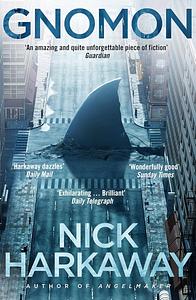Take a photo of a barcode or cover
My goodness. What a tome! The Illuminatus Trilogy has prepared me for mind boggling books of this ilk but I still don't get along with them very well, and yes, I do understand the ending but my brain hurts and after reading through this epic I was hoping for a bigger payoff.
One of the reviews compares the author to Terry Pratchett but I didn't pick up much of this. The author in real life is an energetic delight. I'll definitely try his others.
One of the reviews compares the author to Terry Pratchett but I didn't pick up much of this. The author in real life is an energetic delight. I'll definitely try his others.
The first half of this book was stunning. I felt like it was written just for me. It combined the intertwingled folios of [b:Cloud Atlas|49628|Cloud Atlas|David Mitchell|https://images.gr-assets.com/books/1406383769s/49628.jpg|1871423], the ludic spelunking and indeed Ludovician of [b:The Raw Shark Texts|144800|The Raw Shark Texts|Steven Hall|https://images.gr-assets.com/books/1405099268s/144800.jpg|938197] (though let's give credit to Calvino, and Barthes whom Harkaway would call Calvino's imitator), and the speculative architectural zags of [b:BLDGBLOG|5962048|The BLDGBLOG Book|Geoff Manaugh|https://images.gr-assets.com/books/1348535424s/5962048.jpg|6134898] or Ballard. It evolved the noosphere/reification premise that so tickled me in Harkaway's earlier [b:The Gone-Away World|3007704|The Gone-Away World |Nick Harkaway|https://images.gr-assets.com/books/1328322676s/3007704.jpg|3038235]. It sets all this in an ostensibly incorruptible surveillance state that harbors all manner of too-timely dystopia: systemic injustice, what-if-phones-but-too-much, and at least one (thankfully unsympathetic) fascist antagonist.
I really hoped it wouldn't disappoint. But somewhere around the 2/3 mark, it falls down into pretty bizarre territory, and I'm not sure it recovers. Stepping back, the conclusions the protagonist draws throughout the book feel mostly unearned (intentionally?), and the dreamlike nature of it all means everything is permissible / none of the stakes are meaningful. Given the Kyriakos/Stella relationship, the comparison to The Raw Shark Texts is perhaps too close for comfort (also intentionally?) -- though in any case I feel the former made the same point about ~literature as author's mind connecting to reader's mind~ more elegantly. My final peeve bears mentioning: unlike, say, in Kushiel's Dart, here the sex is prurient, or at the very least gratuitous. I got tired of it early on, and it doesn't let up.
Up and down on this one, but 4 stars for the tremendous positives.
I really hoped it wouldn't disappoint. But somewhere around the 2/3 mark, it falls down into pretty bizarre territory, and I'm not sure it recovers. Stepping back, the conclusions the protagonist draws throughout the book feel mostly unearned (intentionally?), and the dreamlike nature of it all means everything is permissible / none of the stakes are meaningful. Given the Kyriakos/Stella relationship, the comparison to The Raw Shark Texts is perhaps too close for comfort (also intentionally?) -- though in any case I feel the former made the same point about ~literature as author's mind connecting to reader's mind~ more elegantly. My final peeve bears mentioning: unlike, say, in Kushiel's Dart, here the sex is prurient, or at the very least gratuitous. I got tired of it early on, and it doesn't let up.
Up and down on this one, but 4 stars for the tremendous positives.
I received a copy of Gnomon from Penguin First to Read in exchange for a fair and honest review.
Gnomon is many things; a fun word to say, a piece of a sundial, part of a parallelogram, the latest book by Nick Harkaway. Obviously in this instance I’m referring to the last option listed, but I still find it intriguing that the author chose a word that has so many different meanings. This is a beast of a book, weighing in at seven hundred and four pages, so it’s no surprise that Harkaway took his time with building up the story.
Reading the description of Gnomon, I got the impression I was in for a fast paced mystery filled with ethical and philosophical debates. Admittedly I still got plenty of the latter (quite a bit of that, actually), but I still found this novel to be rather slow and laborious to read. While I’m not intimidated by the size of this novel, I do wish it had been slimmed down a bit.
I do absolutely love all the debates this novel brings up. For example, the ethicality of the society that Mielikki Neith lives in; one where everybody is monitored (possibly all of the time) and occasionally forced to undergo a mental screening (where their thoughts and memories are literally analyzed and recorded by a machine). That sounds incredibly intrusive, yes? Well let’s not forget the fact that while they’re getting screened the powers that be (still a bit unclear on how government works in this novel) tweak your brain, check for physical anomalies and fix any problems. This sounds nice, in theory, but then again I’m sure the plan for Miranda sounded nice too (Hint: Serenity reference there). This raises the point: just because we can doesn’t mean we should. I believe this is a point Harkaway was trying to make, and I respect that.
While I enjoyed the mental puzzle this novel presented, I did find myself losing focus fairly frequently. I’d go a chapter or two, and then realize I had to reread the last couple of paragraphs, because my mind had slipped away. I’m not normally one that does that, so I found it upsetting that it kept happening again and again. Perhaps it was the mood I was in at the time, or something else, I can’t say for certain. I do feel that had Gnomon been slightly more concise this might not have happened.
It’s probably worth noting that I haven’t read any of Nick Harkaway’s other novels, though I’ve heard that The Gone-Away World is fantastic. Perhaps this isn’t the best introductory novel for him? I do know that with some authors the first novel you read can make a difference in whether or not you enjoy their work.
For more reviews, check out Quirky Cat's Fat Stacks
Gnomon is many things; a fun word to say, a piece of a sundial, part of a parallelogram, the latest book by Nick Harkaway. Obviously in this instance I’m referring to the last option listed, but I still find it intriguing that the author chose a word that has so many different meanings. This is a beast of a book, weighing in at seven hundred and four pages, so it’s no surprise that Harkaway took his time with building up the story.
Reading the description of Gnomon, I got the impression I was in for a fast paced mystery filled with ethical and philosophical debates. Admittedly I still got plenty of the latter (quite a bit of that, actually), but I still found this novel to be rather slow and laborious to read. While I’m not intimidated by the size of this novel, I do wish it had been slimmed down a bit.
I do absolutely love all the debates this novel brings up. For example, the ethicality of the society that Mielikki Neith lives in; one where everybody is monitored (possibly all of the time) and occasionally forced to undergo a mental screening (where their thoughts and memories are literally analyzed and recorded by a machine). That sounds incredibly intrusive, yes? Well let’s not forget the fact that while they’re getting screened the powers that be (still a bit unclear on how government works in this novel) tweak your brain, check for physical anomalies and fix any problems. This sounds nice, in theory, but then again I’m sure the plan for Miranda sounded nice too (Hint: Serenity reference there). This raises the point: just because we can doesn’t mean we should. I believe this is a point Harkaway was trying to make, and I respect that.
While I enjoyed the mental puzzle this novel presented, I did find myself losing focus fairly frequently. I’d go a chapter or two, and then realize I had to reread the last couple of paragraphs, because my mind had slipped away. I’m not normally one that does that, so I found it upsetting that it kept happening again and again. Perhaps it was the mood I was in at the time, or something else, I can’t say for certain. I do feel that had Gnomon been slightly more concise this might not have happened.
It’s probably worth noting that I haven’t read any of Nick Harkaway’s other novels, though I’ve heard that The Gone-Away World is fantastic. Perhaps this isn’t the best introductory novel for him? I do know that with some authors the first novel you read can make a difference in whether or not you enjoy their work.
For more reviews, check out Quirky Cat's Fat Stacks
challenging
dark
mysterious
medium-paced
Plot or Character Driven:
Character
Strong character development:
Yes
Loveable characters:
Yes
Diverse cast of characters:
Yes
Flaws of characters a main focus:
No
Galaxy Brain
challenging
mysterious
slow-paced
Moderate: Child death, Confinement, Death, Hate crime, Racism, Kidnapping
Still not exactly sure who was real and who wasn't but I appreciate an ambitious novel rather than writing the same thing over and over.
challenging
mysterious
slow-paced
Plot or Character Driven:
A mix
Strong character development:
Yes
Loveable characters:
Yes
Diverse cast of characters:
Yes
Flaws of characters a main focus:
Complicated
"Just because something is done according to the law does not mean that it is lawful. Law is made in the image of an ideal. One can make a law that does not reflect that image, and that law may be a law without being lawful" (p. 13).
This book is dense, convoluted, pretentious and obtuse; the plot is made up of six loosely connected, but entirely separate (in space/time), stories/points of view. This is a rare book where all the points of view are equally interesting and have a compelling POV character.
Be sure to read this on Kindle, otherwise you're in for a rough ride having to look up words you don't know, historical illusions and other languages. A couple of things Kindle doesn't know either - some are made up.
For the first third of the book, there's no explanation as to what the hell is going on, which is tiresome. Since the book is a long, slow read, this part felt interminable. This nearly 700 page book doesn't come together until the last 100 pages so radical patience is required.
If you've got time and attention to dedicate to this book, there's a lot to like here - interesting stories and characters, a complex puzzle to solve and I was invested in the resolution.
This book is dense, convoluted, pretentious and obtuse; the plot is made up of six loosely connected, but entirely separate (in space/time), stories/points of view. This is a rare book where all the points of view are equally interesting and have a compelling POV character.
Be sure to read this on Kindle, otherwise you're in for a rough ride having to look up words you don't know, historical illusions and other languages. A couple of things Kindle doesn't know either - some are made up.
For the first third of the book, there's no explanation as to what the hell is going on, which is tiresome. Since the book is a long, slow read, this part felt interminable. This nearly 700 page book doesn't come together until the last 100 pages so radical patience is required.
If you've got time and attention to dedicate to this book, there's a lot to like here - interesting stories and characters, a complex puzzle to solve and I was invested in the resolution.
adventurous
challenging
dark
emotional
hopeful
inspiring
mysterious
medium-paced
Plot or Character Driven:
Plot
Strong character development:
Complicated
Loveable characters:
Complicated
Diverse cast of characters:
Yes
Flaws of characters a main focus:
No
This may be a little too impressed with itself, but it's quite the ride. Occasionally exhausting, but never boring.



